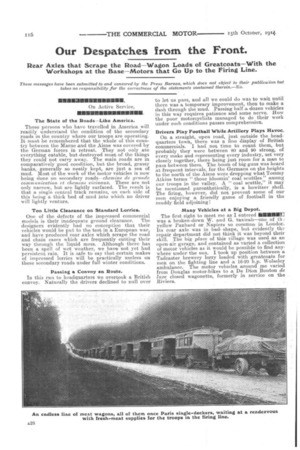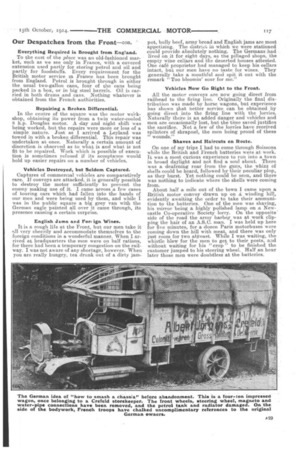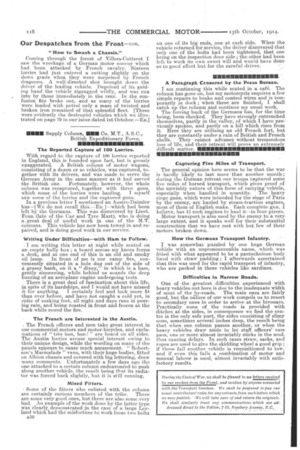Our Despatches from the Front.
Page 4

Page 5

Page 6

If you've noticed an error in this article please click here to report it so we can fix it.
Rear Axles that Scrape the Road—Wagon Loads of Greatcoats—With the Workshops at the Base—Motors that Go Up to the Firing Line.
These messages have been submitted to and censored by the Press Bureau, which does not object to their publica,lan but takes no responsibility for the correctness of the statements contained therein.—ED.
On Active Service, The State of the Roads—Like America.
Those persons who have travelled in America will readily understand the condition of the secondary roads in the country where our troops are operating. It must be remembered that the: whole of this country between tho Marne and the Aisne was covered by the German forces in retreat. They not only ate -everything eatable, but destroyed most of the things they could not carry away. The main roads are in comparatively good condition, but the broad, grassy banks,generally so neatly kept, are just a sea of mud. Most of the work of the motor vehicles is now being done on secondary roads—cliemins de grande eanunnancation et eltemin$ victinatex. These are not only narrow, but are lightly surfaced. The result is that a single central track remains, on each side of this being a thick bed of mud into which no driver will lightly venture.
Too Little Clearance on Standard Lorries.
One of the defects of the impressed commercial models is their inadequate ground clearance. The designers evidently had no conception that their vehicles would be put to the test in a European war, and have produced rear axles which scrape the road and chain cases which are frequently cutting their way through the liquid mess. Although there. has been a spell of wet weather, we have not yet had persistent rain. It is safe to say that certain makes of impressed lorries will be practically useless on these secondary roada under full winter conditions.
Passing a Convoy en Route.
In this run to headquarters we overtook a British convoy. Naturally the drivers declined to null over to let us pass, and all we could do was to wait until there was a temporary improvement, then to make a dash through the mud. Passing half a dozen vehicles in this way requires patience and some nerve. How the poor motorcyclists managed to do their work under such conditions passes comprehension.
Drivers Play Football While Artillery Plays HMTOG, On a straight, open road, just outside the headquarters, town, there was a fine display of British
commer I had not time to count them, but probably they were between 80 and 90 strong, of every make and representing every industry, set very closely together, there being just room for a man to pass between them. The boom of big guns was beard at frequent intervals, for the Germans on the heights to the north of the Aisne were dropping what Tommy Atkins terms " those bloo3nin' coal scuttles" among our troops in the valley. A "coal scuttle," it may be mentioned parenthetically, is a howitzer shell. The firing, however, did not prevent sonic of our men enjoying a friendly game of football in the muddy field adjoining!
Many Vehicles at a Big Depot.
The first sight to meet me as I entered 111111111111111E1 was a broken-down W. and G. taxicab—one of th. yellow Panhard or Napiers so common in London. Its rear axle was in bad. shape, but evidently the repair department did not think it was beyond their skill. The big place of this village was used as an open-air garage, and contained as varied a collection of motor vehicles as it would be possible in find anywhere under the sun. I took up position between a Tadcaster brewery lorry loaded with greatcoats for men on the fighting line and a. 16-20 h.p. Wolseley ambulance. The motor vehicles around me varied from Douglas motor-bikes to a De Dion Bouton de lure closed wagonette, formerly in service on the Riviera.
Our Despatches from the Front—con.
Everything Required is Brought from England.
To the east of the place was an old-fashioned market, such as we see only in France, with a covered extension used partly for storing petrol and oil and partly for foodstuffs. Every requirement for the British motor service in France has been brought from England. Petrol is brought through in either the usual two-gallon cans, four of the cans being packed in a box, or in big steel barrels. Oil is carried in both drums and cans. Nothing whatever is obtained from the French authbrities.
Repairing a Broken Differential.
In the centre of the. square was the motor workshop, obtaining obtaining its power from a twin water-cooled 8 h.p. Douglas motor. A day and night shift was being worked, but the repairs were more or less of a simple nature. Just as I arrived a Leyland was towed in with a broken differential. This repair was undertaken at once. Naturally a certain amount of discretion is observed as to what is and what is not fit to be repaired. Work which is possible of execution is sometimes refused if its acc-eptance would hold up easier repairs on a number of vehicles.
Vehicles Destroyed, but Seldom Captured.
Captures of commercial vehicles are comparatively rare. If convoys are attacked, it is generally possible to destroy the motor sufficiently to prevent the enemy making use of it. I came across a few cases of touring oars which had fallen into the hands of our men and were being used by them, and while I was in the public square. a big grey van with the German eagle Painted all over it came through, its presence causing a certain surprise.
English Jams and Fort ign Wines.
It is a rough life at the Front, but our men take it cli very cheerily and accommodate themselves to the foreign conditions in a wonderful manner. When I arrived at headquarters the men were on half rations, for there had been a temporary congestion on the railway. I was not aware of any shortage, however. When you are really hungry, tea drunk out of a dirty 3am
pot, bully beef, army bread and English jams are most appetizing. The district in which we were stationed could provide absolutely nothing. The Germans had lived on it for eight days, as the pillaged shops, the empty wine cellars and the deserted houses attested. One café proprietor had managed to keep his cellars intact, but our men have no taste for wines. They generally take a mouthful and spit it out with the remark "Too bloomin' sour for me."
Vehicles Now Go Right to the Front.
All the motor convoys are now going direct from railhead to the firing line. Originally the final distribution was made by horse wagons, but experience has shown that better service can be obtained by going direct into the firing line with the lorries. Naturally there is an added danger and vehicles and men. are occasionally lost, but the time saved justifies the sacrifice. Not a few of the lorries have received splinters of shrapnel, the men being proud of these "wounds."
Shaves and Haircuts en Route.
On one of my trips I had to come through Soissons while the British and Ftrench batteries were at work. It was a most curious experience to run into a town in broad daylight and not find a soul about. There was a deafening roar from the guns, the whizz of shells could be heard, followed by their peculiar plop, as they burst. Yet nothing could be seen, and there was nothing to indicate where the shells were coining from.
About half a mile out of the town I came upon a British motor convoy drawn up on a winding hill, evidently awaiting the order to take their ammunition to the batteries. One of the men was shaving, Ins mirror being a highly polished lamp on a New. castle Co-operative Society lorry. On the opposite side of the road the army barbeir was at work clipping the hair of an A.S.C. man. I was held up here for five minutes, for a dozen Paris motorbuses were coming down the hill with meat, and there was only just room for two abPeast. While I was waiting, the whistle blew for the men to get to their, posts, and without waiting for his " crop " to be finished the customer jumped to his steering wheel. Half an hour later those men were doubtless at the batteries. "How to Smash a Chassis."
Coming through the forest of ITillers-Cotteret I saw the wreckage of a German motor convoy which had been attacked by French cavalry. Sixteen lorries had, just entered a cutting slightly on the down grade when they were surprised by French dragoons. A well-directed shot brought down the driver of the leading vehicle. Deprived of its guiding hand the vehicle zigzagged wildly, and was run into by those immediately in the rear. In the confusion fire broke out, and as many of the lorries were loaded with petrol only a mass of twisted and broken iron remained of that splendid fleet [These were evidently the destroyed vehicles which we illustrated on page 79 in our issue dated 1st October.—En.]
MUM Supply Column, MEM Co. WT., A. S.C., British Expeditionary Force, The Reported Capture of 100 Lorries.
With regard to the capture of 100 lorries reported in England, this is founded upon fact, but is grossly exaggerated. A British column of motor wagons, consisting of a dozen or so vehicles, was captured, together with its drivers, and was made to serve the German Army in the same manner as it had served the British one. Fortunately, however, the whole column was recaptured, together with three guns, Which some of the lorries were hauling. I myself saw some of the lorries and the captured guns. In a previous letter I mentioned an Anstro-Daimler bus—[We do not recall this.—En. 1—which had been left by the Germans. This was discovered by Lieut. Fenn (late of the Car and Tyre Mart), who is doing a. great deal of useful work in one of the M.T. columns. This vehicle has now been towed in and repaired, and is doing good work in our service.
Writing Under Difficulties—with Ham to Follow.
.1. am writing this letter at night while seated on an empty bully box ; a board across my knees forms a desk, and at one end of this is an old and smoky oil lamp. ln front of me is our camp fire, conveniently situated in a hole dug out of the side of a grassy bank, on it a " dixey,' in which is a ham, gently simmering, while behind us sounds the deep -buzzing of an aeroplane engine undergoing tests.
There is a great deal of fascination about this life, in spite of its hardships, and I would not have missed it for anything. I certainly feel and look more fit than ever before, and have not caught a cold yet, in spite of soaking feet, all night and days runs in pouring rain . and being roasted in front and frozen at the back while round the fire.
The French are Interested in the Austin.
, The French officers and men take great interest in our commercial motors and motor-bicycles, and exclaMations of " tre.s bon, bon " are heard on all sides. The Austin lorries arouse special interest owing to their unique design, while the wording on many of the Panels appears to cause much amusement " Robertson's Marmalade " vans, with-their huge bodies, fitted on Albion chassis and covered with big lettering, draw many comments. Unfortunately a few days ago the one attached to a certain column endeavoured to push along another vehicle, the result being that its radiator was forced back slightly, but it is still running.
Mixed Fitters.
Some of the fitters who enlisted with the column are certainly curious members of the tribe. There are some very good ones, but there are also some very bad. An example of the work done by the latter Lyp.e was clearly, demonstrated in the cas'e of a large Leyland which had the misfortune to Work loose two bolts 130 on one of. its big ends, one at each side. When the vehicle returned for SerVice, the driVer discovered that only one of the bolts had been tightened, that one being on the inspection door side ; the other had been laf t to work its own sweet will and would have done so to good effect but for the careful driver.
11111111111111•111111111111111111111. A Paragraph Censored by the Press Bureau.
I am continuing this while seated in a cafe. The. column has gone on, but my motorcycle requires a few simple repairs to brake and control wires and is temporarily jin dock ; when these are finished, I shall catch up the column and continue my usual work. The forcing back of the Germans has, for the time being, been checked. They have strongly entrenched themselves, partly, in the valley, of which I have previously spoken, and partly on a hill which rises from it. Here they are utilizing an old French fort, but they are constantly under a rain of British and French shells. They cannot advance without tremendous loss of life, and their retreat will prove an extremely difficult matter, 111111=111111111Hill.1111111111111111111111 111111111111111111111111111111111111111111111111M Capturing Five Miles of Transport.
The general opinion here seems to be that the war is hardly likely to last more than another month; during the German retreat our troops captured some five miles of horsed transport, which gives proof, of the unwieldy nature of this form of carrying vehicle, especially when handled in quantity. The heaa-y siege guns, which were intended for the siege of Patis by the enemy, are hauled by steam-traction engines, most of them of English make. Each complete gun, .I believe, has 13 such engines to haul it—in four pieces. Motor transport is also used by the enemy to a very large extent, and it speaks well for their substantial construction that we have met with but few of their motors broken down.
How the Germans Transport Infantry.
I was somewhat puzzled by one huge German vehicle with an unpronounceable name, which was fitted with what appeared to be a pantechnicon body. lined with straw padding ; I afterwards ascertained • that this was used for the rapid transport of infantry, who are packed in these vehicles like sardines, Difficulties in Narrow Roads.
One of the greatestdifficulties experienced with heavy vehicles out here is due to the inadequate width of most of the by-roads. The main ones are fairly good, but the nature of our work compels us to resort to secondary ones in order to arrive at the bivouaes. Practically none of the roads is provided with ditches at the sides, in consequence we find the centre is the only safe part, the sides consisting of slimy ooze, sometimes several inches deep, the result being that when one column passes another, or when the heavy vehicles draw aside to let, staff officers' cars pass, one or more almost invariably sticks in the mud, thus causing deTays. In such cases straw, sacks, and ropes are used to give the, skidding wheel a good grip ; if these fail another vehicle is requisitioned to tow, and if even this fails a combination of motor and manual labour is used, almost invariably with satisfactory results.






















